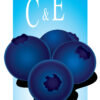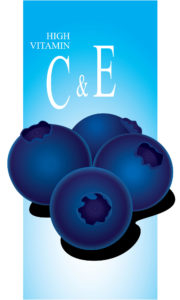
Best Eye Vitamins for Cataracts
About one in six Americans 40 years or older have already started developing cataracts in one or both eyes. By the time they hit 75 years old, that number jumps to about 50 percent. Over half of all seniors in Western countries have had some type of experience with cataracts. Whether they currently have cataracts or had cataract surgery in the past, it’s really hard to find someone older who has not experienced this condition. So, are there specific vitamins for cataracts?
Luckily, yes. There are vitamins for cataracts that you can add to your regimen now to help build up your defenses later.
So, whether you’ve had a cataract before or not, here are some vitamins to help you prevent cataracts. Consider taking these, especially if you have had one in the past!
What Are Cataracts?
Before we look at what vitamins are good for cataracts, it is important to understand just what a cataract is. Cataracts refer to the clouding over of the eye – the lens, to be more specific – so much so that it impairs vision. The majority of cataracts are related to old age, and this is the main cause of the condition.
Cataracts can occur simultaneously in both eyes, but they can also just occur in one eye at a time. You cannot spread a cataract to your other eye if only one eye is affected.
There are some cataracts that are not related to age. These include secondary cataracts, traumatic cataracts, congenital cataracts, and radiation cataracts. Secondary cataracts can form after surgery and also in relation to other eye conditions like glaucoma. They can also be brought on by certain health conditions.
Traumatic cataracts are ones that appear after eye surgery. They can appear very shortly after surgery, or they can appear years later. Congenital cataracts form in some babies. These do not always cause vision problems. Finally, radiation cataracts form when someone has been exposed to radiation.
Who Is at Risk?
Some people are more at risk for cataracts than others. As mentioned earlier, many people get them as they age. You can get a cataract at any time, but most people will not get one before 50. It is even more common to get them in your sixties.
Others who are at a higher risk include those with diabetes, those who smoke, and those who expose their eyes to direct sunlight. You can control whether or not you smoke and whether or not your eyes are in direct sunlight, but there is not much you can do about diabetes. Take control of your other risk factors, especially if you have diabetes, in order to lessen your chances of getting a cataract.
Vitamins for Cataracts
Vitamins are a great, natural way to treat or prevent cataracts. If you find you are not getting enough of the following nutrients through your normal dietary routine, consider making some changes to your diet. If you prefer, you can always opt for a supplement so that you are getting the nutrition your eyes need.
Vitamins C and E

Two important vitamins for cataracts are vitamins C and E. Both of these vitamins can treat cataracts, but they can also slow the progression of the cataracts and help prevent them. In one study, researchers found that vitamin C likely helps those diagnosed with diabetes to avoid developing cataracts. Research has shown that people who get more vitamin C and E have a lower chance of cataracts over their lifetimes.
Those who have taken supplements or gotten sufficient amounts of both vitamins for many years did not see a normal progression of cataracts. By taking vitamin supplements like these for a long period of time, you can lessen your chance of getting a cataract even more!
It’s essential to start your kids on the right dietary path. While supplements are convenient, try to get as many natural sources of these vitamins in your children’s diets. Choosing the right foods now can impact whether they get cataracts in the future. If they don’t like these nutrient-rich foods, consider blending them into a smoothie. Or, hiding them in meals your kids like. For example, blending broccoli into your mashed potato recipes. Instead of serving sweets and candy for dessert, make a nutritious fruit bowl or homemade fruit sorbet.
Vitamin C can be found in oranges, blueberries, spinach, guava, papaya, strawberries, and many other fruit sources. You can also get vitamin C-packed candies that give you a full day’s worth of vitamin C in one little treat. Or, try a vitamin-C immunity beverage. Just make sure you aren’t also packing too much sugar into your diet!
Vitamin E is also found in blueberries, as well as almonds, sunflower seeds, broccoli, peanuts, spinach, tomatoes, and mangos. You can also get easy-to-swallow vitamin E gel capsules from health food stores and supermarkets. These simple additions to your self-care regimen will do wonders to prevent cataracts.
Lutein and Zeaxanthin
Lutein and zeaxanthin are two other nutrients that are good for preventing cataracts. Both of these are naturally occurring in human eyes, so making sure you replenish these nutrients in your system can go a long way!
Research has shown that both of these nutrients have been successful in reducing the need for cataract surgery in patients who took regular doses. Other studies have shown that people with the most lutein in their systems have had fewer cataracts.
Sources of lutein and zeaxanthin include kale, spinach, turnip greens, romaine lettuce, green beans, eggs, oranges, broccoli, and corn. There are plenty of natural food sources for these nutrients, so you should not have a problem getting enough of them in your system, as long as you are eating a healthy diet! Consider adding dark leafy greens to your smoothies, omelets, and pasta. Aim to have a serving of greens with every meal.
If you want, you can always seek out supplements of these nutrients listed above to help improve cataracts. However, it is best to get them from natural food sources.
Our Rebuild Your Vision Ocu-Plus Formula Contains All 17 Vitamins, Minerals, and Herbal Supplements to Protect Against Cataracts!













I just read an article that blew my mind. it said that Vitamin C …causes cataracts? Can this be true?
What did Robin Hama take to clear up the cataracts in both eyes without surgery?
I had the beginning of cataracts in both eyes and they cleared up without surgery
What helped you ?
Robin Hamar – What did you do to clear up cataracts ? Please share your experience- thank you.
Cataract depends depends highly on age, but there are other factors that also affect cataract development such as, family history & ethnicity. Research shows that cataract can be controlled by avoiding smoking, reducing exposer to sunlight by wearing UVA/UVB glasses and eating leafy vegetables.
I have always known that vitamin C and E are important for your eyes but never really knew exactly which foods I should be eating. Now I have plenty of different food options that contain vitamin C and E. This is great information thank you for sharing.